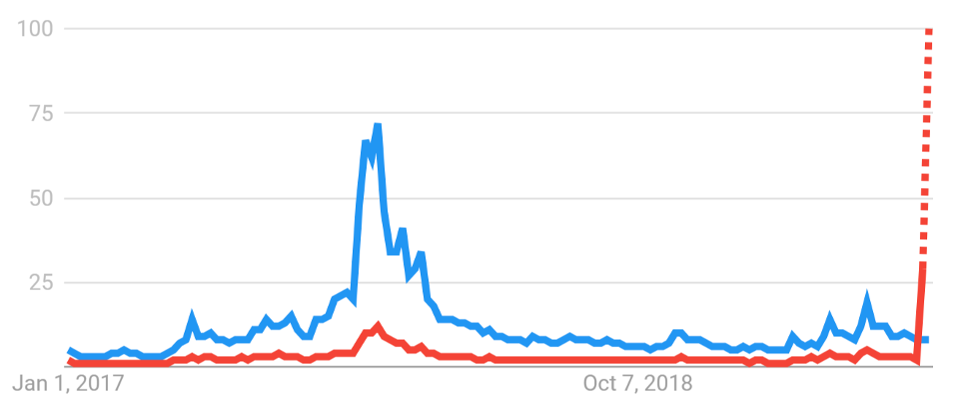One unique characteristic of nearly all things crypto is that they are digitized in a way that yields instant online real-time data, and where there is data, there is always the potential to delve deep to find helpful “nuggets” of information. If you are smart enough and clever enough, a trader in cryptos can also instantly monetize his mined “nuggets” into gains in the market, if the discovered correlation repeats and becomes part of a successful trading strategy. Google search trends are a new arena of fertile ground.
It is no longer a secret that there has been a distinct correlation pattern that has formed around Google searches for “Bitcoin” and “BTC” and for Bitcoin price behavior. Sudden surges in related searches can tend to precede market rallies, a leading indicator that can enhance one’s trading bottom line overnight. Analysts were signaling a high alert last week, when both Bitcoin and BTC searches were eclipsing similar efforts for “Brexit” and “Boris”, aka the new Prime Minister of the UK, Boris Johnson. Something about the letter “B” had taken over Google, but as the week waned, new evidence seemed “weird”.
Bitcoin, the “Blue” line, was outpacing searches for “BTC”, the “Red” line, until BTC turned the tables in a flash. Earlier reports had noted that it was strange for BTC to be overtaking Bitcoin, let alone leaving it in its dust.
As the folks at Asktraders.com had noted on Tuesday:
Brexit protesters have taken to the streets in London, Liverpool, Manchester, and Belfast, angered over whatever Boris Johnson, the new Prime Minister, is trying to achieve with his pro-Brexit-No-Deal agenda. Dissatisfaction is running high, and the level of Google searches would logically follow that “Boris” and “Brexit” would be key search terms. The advent of “BTC” and “Bitcoin” throws another dynamic into the debate of what is the public thinking and where do their concerns lie.
Early signs of the “spike” were forming, without a clear cause.
The momentum of the spike did not subside, causing many analysts to question the credulity of what was being reported. The “affection”, if that is not too descriptive a term, that some traders and analysts have developed for Google search correlations has manifested itself in the programming of trading robots that actually key off this type of leading indicator, if it can really be given that reputation at this juncture in crypto market evolution. When “nuggets” like these are found and word spreads, the benefit is typically diluted to the point that its usefulness no longer exists.
Researchers at Kryptografen, a website that specializes in bitcoin and cryptocurrency news and analysis, believe they may have found the answer to why the “weirdness” in Google search trends appeared so suddenly. Bendik Norheim Schei, an analyst with Kryptografen, noticed that the initial search volumes were emanating from Romania. Others had commented that trades seemed to be coordinated, since they were occurring in each country at around 4am or 5am in the morning, when traffic is typically subdued, a clever way to overly influence graphical presentations.
Schei explained to reporters at Forbes:
It is reasonable to assume that someone is behind these radical changes That the same pattern can be seen all over the world may indicate that VPN services have been used to distribute the search across the world, thus achieving a global trend. Google Trends points out that changes have been relatively large in Romania. Is this the source, or is it just because there have been fewer searches for BTC previously? Whatever the answer is–something very strange has happened to the interest in the keyword ‘BTC’ this past week.
Glen Goodman, trading veteran and crypto author, added another piece of the puzzle:
Somebody’s trying to game the trading algorithms. There are algorithms programmed to look at Google Trends data and try to find correlations between numbers of searches for the word ‘BTC’ and the movements in the bitcoin price. If they detect patterns, it may be profitable to trade off that data. This hacker may be buying some BTC, then sending a ton of ‘BTC’ search queries to Google.
Bitcoin trading markets are still in their infancy stage, where price manipulation tactics can still bear fruit, but who would have thought that using robots to seriously influence global Google search trends could lead to a sudden windfall of ill-gotten gains? Obviously, there was one hacker somewhere smiling broadly last week, when BTC prices bolted forward for no apparent reason. The SEC would not have been pleased.

